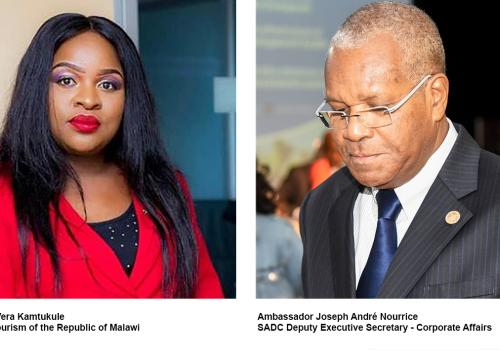-Environmental degradation, climate change impacts, and illegal harvesting of natural resources should be addressed, SADC Ministers agreed.
John Cassim

Harare, Zimbabwe (CZ) – Environment, Natural Resources, and Tourism Ministers from the Southern African Development Community (SADC) have been urged to prioritise policies, projects, and activities on environment, natural resources, and tourism in the region.
The call was made during the virtual meeting of the Ministers for Environment, Natural Resources, and Tourism, held on June 22, 2023.
This was meant to review progress on activities and projects supporting the implementation of SADC Protocols and strategies to support the environment, natural resources, and tourism sectors.
In her remarks, Vera Kamtukule, Minister of Tourism of Malawi, emphasised the significance of advancing programs and activities in these sectors.
“The programs have a major impact on shaping the environment and play a key role in cultural heritage, as well as making a significant contribution to socio-economic development,” She said.
She made the remarks on behalf of Eve Bazaiba Masudi, Minister of Environment and Sustainable Development from the Democratic Republic of the Congo and Chairperson of the SADC Ministers responsible for Environment, Natural Resources, and Tourism.
As outlined in the SADC Regional Indicative Strategic Development Plan (RISDP) (2020-2030) under the pillar of cross-cutting issues, Minister Kamtukule emphasised that these sectors are intertwined.
“The pillars serve a significant role in maintaining the balance of ecosystems, providing habitat for wildlife, plants, and animals,” she said.
She expressed appreciation to Member States for their commitment, stating that it demonstrated the significance of efforts to build the SADC, which incorporates peace, inclusiveness, and competitiveness in a middle-to high-income industrialised region in which citizens enjoy sustainable economic well-being, freedom, and justice.
“Sustainable management, conservation, and protection of the environment, natural resources, and tourism development are central to the development agenda as prescribed in the RISDP 2020–2030 and the SADC Vision 2050.
There is an urgent need for the SADC region to address challenges such as environmental degradation, climate change impacts, illegal harvesting of natural resources, and underdevelopment of tourism,” said Ambassador Joseph Nourrice, SADC Deputy Executive Secretary responsible for Corporate Affairs.
He represented Elias M. Magosi, the Executive Secretary of SADC.
Meanwhile, illegal harvesting of natural resources and underdevelopment of tourism, which are recurrent and pervasive, were said to be significantly affecting agriculture, infrastructure, human health, terrestrial and marine ecosystems, as well as water resources.
On the other hand, the Ministers approved the new Board of Directors for winding up the Regional Tourism Organization of Southern Africa (RETOSA).
Regarding the Multilateral Environmental Agreements (MEAs), Ministers noted priorities for the SADC region and agreed to speak in one voice during negotiations and the implementation of MEAs.
These include;
- Convention on International Trade in Endangered Species of Wild Flora and Fauna (CITES)
- Ramsar Convention on Wetlands, United Nations Convention on Biological Diversity (UNCBD)
- United Nations Framework Convention on Climate Change (UNFCCC)
- United Nations Convention to Combat Desertification (UNCCD)
During the meeting, the Ministers approved the following:
- On Natural Resources management, approval was given for the SADC-CITES Engagement Strategy 2022–2026.
- SADC Law Enforcement and Anti-Poaching Strategy (LEAP)
- Wildlife-Based Economy Strategy Framework
- Costed Action Plan (CAP) for operationalisation of the SADC Forestry Strategy 2020–2030
- TFCA’s revised program
On Environment and Climate Change, Ministers approved:
- SADC Blue Economy Strategy and Action Plan and its associated studies
- SADC Drought Risk Management and Mitigation Strategy (DRIMMS)
- SADC Circular Economy Strategy and SADC Marine Pollution Response Plan
Further, ministers took note of the implementation of the Global Climate Change Alliance Plus (GCCA+) Program, among others.
